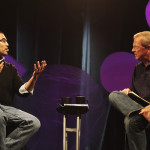Douglas Wilson vs. Christopher Hitchens: A Catholic Perspective
by Dr. Bryan Cross
Filed under New Atheists
I just finished teaching Aristotle’s Nicomachean Ethics this semester. This is the tenth year I have taught it, and every time I teach it, I more deeply appreciate its truth and importance. One reason for its importance can be found in the Wilson-Hitchens video that I discuss below.
Twenty years ago, I believed what is called divine command theory.1 I had grown up thinking that right and wrong were based on divine commands, and could be known only by knowing divine commands. At that time, I did not understand that divine commands concerning ethics were based on the natures of things, and that we can know right and wrong by the natural power of reason.
It was November, 1989. My brother and I were home for Thanksgiving break. I was home from the University of Michigan, and he from his first year at Wheaton College. The two of us stayed up until almost three o’clock in the morning, sitting in the family room debating divine command theory: I was defending it, he was opposing it. Drawing from Plato’s Euthyphro, my brother asked (and I’m paraphrasing and summarizing): “Are ethical truths true because God commands them, or does God command them because they are true?” I replied, “They are true because God commands them.” To which he replied, “Why does God command these and not others? If rape is wrong only because God commanded us not to do it, then if God commanded us to do it, rape would be right and good. (And we may replace the word ‘rape’ with any other term referring to some heinous atrocity, e.g. genocide, cannibalism, incest, pedophilia, necrophilia, abortion, blasphemy, etc.). “And in that case,” said my brother, “how would God be morally distinguishable from the Devil?” “But,” I protested, “God wouldn’t do that.” “Why not?” he replied. “Because”, I said, “that’s not His character.” “Well,” he replied, “then at least we now agree that the wrongness of rape is not because God commanded us not to do it, but rather because it is contrary to God’s character. But what is it about the act of rape that makes it contrary to God’s character?” “Well,” I replied, “God is loving and good, and rape is an act of selfishness and violation, completely disregarding the good of the other.” “So,” he said, “rape is wrong because it is not good and loving, and whatever is not good and loving is contrary to God’s character?” “Yes, I think so.” I said. He replied, “Well, now you are agreeing that rape is wrong because of something about the nature of rape; and that God commands us not to do that act because of the nature of that act in relation to His character.”
At that time I believed that man, through his natural power of reason, could come to knowledge of, say, botany or mathematics or cell biology or quantum physics. But I believed that unlike the truths in those sciences, ethical truths were fundamentally and entirely divine commands.2 And therefore, we cannot have a true ethical system without basing it on the ethical prescriptions and prohibitions laid out in Scripture. Even our conscience, according to my theology of twenty years ago, was simply a God-implanted blueprint of those divine commands, like pre-loaded software; that software had been corrupted by the Fall, but the original code was a kind of database of divine commands.
My brother did not persuade me that evening, but his criticisms were strong enough that I was less confident that I was right. I had an inkling that I was bringing philosophical assumptions to my interpretation of Scripture, but what those assumptions were, and how I was to evaluate them, was an inscrutably dark mystery to me, extending into an area that could be symbolized as one large question mark. Even the word ‘philosophy’ elicited defensive and highly skeptical affections within me, because the term ‘philosophy’ was for me associated with deception and man’s wisdom.3 I subsequently read Plato’s Euthyphro, and saw how Socrates presented Euthyphro with that fundamental dilemma: Is something good because God loves it, or does God love it because it is good? I could give a glib answer: “It is good because it conforms to God’s nature”, but I did not know what that meant; it was a bit of semantic jargon to patch over a gaping intellectual hole. It left me with more questions, and I didn’t know how to answer them, or even how to begin to answer them.
Over the next two years I started reading books on the ethics of euthansia, and assisted suicide. I was a pre-med student, and I went to hear Dr. Jack Kevorkian (“Dr. Death”) give a talk at the Hillel Center near campus. He was in the prime of his publicity around that time, and the issues of euthanasia and assisted suicide were hot topics for that reason. Nobody seemed to have good arguments against his positions. I started doing some research on the subject. Most of the books I was reading that opposed euthanasia were written by Evangelical Christians; these were books that I could find at local Christian bookstores. And these books generally approached ethical questions from the point of view of sola scriptura, which was the only Christian point of view I knew at the time. I noticed that the Christian authors whose arguments were more cogent and persuasive were incorporating philosophical claims into their writing; they were not being fully consistent with sola scriptura, at least in the “sufficiency” sense of sola scriptura.4 But I could see that the merely sola scriptura approach was not sufficient to deal with moral questions about beginning of life and end of life issues, especially those involving medical technology, i.e. those falling under the category of medical ethics.
The other major problem with the sola scriptura approach is that in a democratic society in which the majority of citizens do not believe in Scripture, a Christian’s only solution to the problem of the legalization of assisted suicide and abortion, is evangelism, i.e. saving souls. In the public square, the only thing a sola scriptura Christian can do is open his Bible and start pointing to verses. And if other people do not accept the Bible, the only thing a sola scriptura Christian can do is convert them to Christianity so that they accept the Bible as authoritative.
A few years later, in seminary I took a class on Christian ethics, and we were taught divine command theory. Natural law and virtue theory were dismissed in a rather cursory fashion. I distinctly remember asking the professor about the basis for divine command theory. He referred me to Richard Mouw’s book, The God Who Commands: A Study in Divine Command Ethics (1990). I immediately went to the library and read the book and was disappointed by it. It didn’t stand up to Thomas Aquinas, whom I had started to read at that time. I came to understand that Mouw’s divine command theory was based ultimately on a rejection of the entire Aristotelian-Thomistic philosophical tradition. As I researched the issue more deeply, I came to see that divine command theory was based on two other interrelated philosophies, i.e. voluntarism and nominalism. These had their roots in the medieval thinkers Duns Scotus and William of Ockham, respectively. But the Protestant conception of reason as depraved and fallen similarly lends itself to distrusting reason.5 If reason is fallen, then we can’t trust reason, whether it be the reason of others, or even our own.
By the time I finished seminary, I saw that the doctrine of the fallenness of reason was often applied in a rather arbitrary fashion. Philosophy was distrusted, because it was a product of fallen reason. But all the other sciences, except those making claims that conflicted with our interpretation of Scripture, were generally trusted. Moreover, we trusted our reason when we approached Scripture, in textual criticism, translation and interpretation. We trusted the reasoning of our professors and pastors. Of course we believed that the Holy Spirit was helping us. But even that belief was itself something we determined by using and depending upon reason, in order to interpret Scripture as teaching that the Holy Spirit would help us. That leads me to this video, concerning the debate between Douglas Wilson and Christopher Hitchens.
Wilson believes that Christianity is “objectively good”. (4:18) He claims that Christians are not rationalists. He says, “Every position is a faith position.” (4:30) Wilson says, “Faith provides me with a basis for morality … faith provides me with an objective basis for moral considerations, moral values.” (5:00-5:15) A bit later he says, “I want to base everything on the Bible.” (11:02) He then considers the objection that, by starting with Scripture and defending his doing so by appealing to Scripture, he is begging the question. To that objection he replies, “If a person says, I want to base my whole worldview on reason, and I would say, Why do you do that?, when he turns to give me a reason, what’s he doing? He’s flipping open his Bible.” (11:20-11:35)
Wilson thinks that starting with reason is just as much an act of faith as starting with Scripture (or starting anywhere else for that matter). That’s why Wilson says that not only are Christians not rationalists, even rationalists are not rationalists. (4:25) In other words, for Wilson, there is no such thing as rationalism. There is only faith of some sort as an epistemic starting point. But ‘faith’ as an epistemic starting point is not what the Catholic Church teaches faith to be. If one’s epistemic starting point is faith, rather than knowledge of the world through our senses, then faith is an arbitrary, non-rational, leap in the dark. By contrast, the Catholic Church teaches that the assent of faith is “by no means a blind movement of the mind.”6 Rather, the assent of faith is guided by motives of credibility that are grasped by reason. Faith as an arbitrary, non-rational leap in the dark, is fideistic faith. And Wilson’s position is a form of fideism.
The fundamental mistake of presuppositionalism’s fideism is the philosophical skepticism upon which it is built (see here for my critique of presuppositionalism.) Hitchens is an admitted skeptic not just about the existence of God, but about the possibility of acquiring truth. (See 7:30 – 8:20 in the video.) But Wilson is no less a skeptic, except that Wilson has added fideism to his skepticism. Both men exemplify the skepticism of our time, a skepticism that doubts that reason can get us to truth. This skepticism regarding human reason was the concern of Pope Benedict XVI in his Regensburg address in September of 2006. And it was the concern of Pope John Paul II in his papal encyclical Fides et Ratio (Faith and Reason) in 1998. There he writes,
Against all forms of rationalism, then, there was a need to affirm the distinction between the mysteries of faith and the findings of philosophy, and the transcendence and precedence of the mysteries of faith over the findings of philosophy. Against the temptations of fideism, however, it was necessary to stress the unity of truth and thus the positive contribution which rational knowledge can and must make to faith’s knowledge: “Even if faith is superior to reason there can never be a true divergence between faith and reason, since the same God who reveals the mysteries and bestows the gift of faith has also placed in the human spirit the light of reason. This God could not deny himself, nor could the truth ever contradict the truth.”7
And then
There are also signs of a resurgence of fideism, which fails to recognize the importance of rational knowledge and philosophical discourse for the understanding of faith, indeed for the very possibility of belief in God. One currently widespread symptom of this fideistic tendency is a “biblicism” which tends to make the reading and exegesis of Sacred Scripture the sole criterion of truth.8
The fideism of presuppositionalism implicitly denies that grace builds on nature or perfects nature. That is because faith is to reason what grace is to nature; faith is a gift of grace, and reason belongs to human nature. So if our theology denies or rejects nature, our theology then loses a place for grace as such. The Catholic Encyclopedia article on ‘fideism’ explains how fideism destroys faith itself:
Fideism owes its origin to distrust in human reason, and the logical sequence of such an attitude is scepticism. It is to escape from this conclusion that some philosophers, accepting as a principle the impotency of reason, have emphasized the need of belief on the part of human nature, either asserting the primacy of belief over reason or else affirming a radical separation between reason and belief, that is, between science and philosophy on the one hand and religion on the other. Such is the position taken by Kant, when he distinguishes between pure reason, confined to subjectivity, and practical reason, which alone is able to put us by an act of faith in relation with objective reality. It is also a fideistic attitude which is the occasion of agnosticism, of positivism, of pragmatism and other modern forms of anti-intellectualism. As against these views, it must be noted that authority, even the authority of God, cannot be the supreme criterion of certitude, and an act of faith cannot be the primary form of human knowledge. This authority, indeed, in order to be a motive of assent, must be previously acknowledged as being certainly valid; before we believe in a proposition as revealed by God, we must first know with certitude that God exists, that He reveals such and such a proposition, and that His teaching is worthy of assent, all of which questions can and must be ultimately decided only by an act of intellectual assent based on objective evidence. Thus, fideism not only denies intellectual knowledge, but logically ruins faith itself.
Given Wilson’s fideism, there is no common rational ground by which to adjudicate between the positions of Wilson and Hitchens. That is why Hitchens is exactly right when he says, “There is no bridge that can suffice.” (6:39) But that’s also why Hitchens is wrong when he goes on to say, “One of us has not just to lose the argument; one of us has to admit real moral defeat.” (6:49) The idea of losing an argument or being defeated in a debate implies a shared standard. If there is no shared standard, then there is only “winning according to my worldview” or “losing according to my interlocutor’s worldview”, and then in principle at least, each participant can claim victory, and neither need admit defeat. But then there’s no point in debating in the first place, except to gain publicity; there is no shared means of mutually discovering truth and agreeing upon its truth.
If one’s whole epistemic edifice is built upon a mere leap-in-the-dark assumption, as Wilson’s is, then since nothing can be any more certain than that upon which it rests, one still does not get any certainty. You can’t ‘boot-strap’ certainty. Your conclusions cannot be more certain than your premises. So if you start with a leap-in-the-dark assumption (and you have no idea whether it is true or not), then nothing that is built on that assumption can be any more certain. Hence the fideist as such is, in principle, no less uncertain of the truths of faith than the skeptic is uncertain of the truth of anything at all. And that applies no less to moral truths.
In the video (8:50-9:08) we see Hitchens criticizing a Jewish rabbi (presumably), precisely by assuming that if there is a God, God’s relationship to morality must be that of divine voluntarism, and then pointing out the implications with respect to the arbitrariness of good and evil. The voluntarism that underlies Wilson’s fideism makes Wilson’s position susceptible to precisely this very criticism. In his Regensburg address in 2006, Pope Benedict said the following:
In all honesty, one must observe that in the late Middle Ages we find trends in theology which would sunder this synthesis between the Greek spirit and the Christian spirit. In contrast with the so-called intellectualism of Augustine and Thomas, there arose with Duns Scotus a voluntarism which, in its later developments, led to the claim that we can only know God’s voluntas ordinata. Beyond this is the realm of God’s freedom, in virtue of which he could have done the opposite of everything he has actually done.9
In the broader context of that address, Pope Benedict is critically addressing the moral implications of the divine voluntarism implicit in an Islamic conception of God. But Pope Benedict’s criticism is the very same objection Hitchens raises to the Jewish rabbi, and to which Wilson’s fideism is similarly subject.
Twenty years ago, I didn’t understand that ethics was about living according to reason, and that sin and vice were so because they are contrary to reason. According to my way of thinking at that time, fallen reason is quite incapable of showing us moral truths, and so, apart from Scripture we are left without access to objective truths regarding morality. There are only individual instances of moral reasoning, and “who is to say who is right?” But, we know that that cannot be right. That is why if we do not know true philosophy, and especially if we have fallen for the epistemological skepticism of our time, Wilson’s fideism is attractive, because by our very nature we long for truth, and we’ll even make an irrational leap to get to a position of believing that we have attained it.
That is why Aristotle is so important. Aristotle shows how from what we already know through our common human experience of the world, we can understand virtue and vice, and their epistemic grounding in philosophical truths about human nature and the human person. Our shared human nature provides the shared rational framework and criteria by which to adjudicate between various hypotheses, and so reason together. It is only by this mutual participation in rationality that Hitchens and Wilson can criticize each other’s positions, in something more than a solipsistic way. What both are missing, is Aristotle. And that is why watching them debate is like watching the skeptic Sextus Empiricus debate Nicolas of Autrecourt, whose fideism was condemned by the Catholic Church in the fourteenth century.10 So when I reflect on ten years of teaching Aristotle, in light of my position twenty years ago, I see the way in which Aristotle provides an important philosophical understanding of nature, the very nature that grace perfects and upon which grace builds.
Related Posts
Notes:
- Divine command theory is the notion that what makes a good action good, and what makes an evil action evil, is fundamentally a command of God. This position is also called divine voluntarism. ↩
- I once was told that in order to learn mathematics, we should start from Scripture, and find every verse in Scripture that uses math or relates to math, and then build from there. The methodology was clearly ridiculous to me at the time, precisely because I recognized that there are many kinds of truths, including mathematical truths, that we can recognize as objectively true, apart from Scripture. ↩
- Cf. 1 Cor 1:18-25; Col 2:8 ↩
- The term sola scriptura has different senses, and I’m using it here in the sense popular among Evangelicals as meaning that Scripture is entirely sufficient to deal with all questions involving faith and morals. ↩
- Consider Martin Luther’s comments about reason:
“Reason is the devil’s greatest whore; by nature and manner of being she is a noxious whore; she is a prostitute, the devil’s appointed whore; whore eaten by scab and leprosy who ought to be trodden under foot and destroyed, she and her wisdom . . . Throw dung in her face to make her ugly. She is, and she ought to be, drowned in baptism . . . She would deserve, the wretch, to be banished to the filthiest place in the house, to the closets [i.e. toilets].” (Works, Erlangen Edition v. 16, pp. 142-148)
Francis Schaeffer, in his book Escape from Reason blames Aquinas for not recognizing the fallenness of reason; according to Schaeffer, Aquinas is for that reason the pivotal figure responsible for the rationalism that eventually led to nineteenth century theological liberalism and the subsequent loss of faith in Scripture. I think Schaeffer is quite mistaken on this point. What led to theological liberalism and rationalism was not a failure to recognize the fallenness of reason, but a rejection of the Church as the divinely appointed teacher (magisterium) and interpreter of Scripture. ↩
- First Vatican Council 3.3.6 ↩
- Fides et Ratio, 53 ↩
- Fides et Ratio, 55 ↩
- See here. ↩
- Cf. Denzinger 553-570 ↩
Note: Our goal is to cultivate serious and respectful dialogue. While it's OK to disagree—even encouraged!—any snarky, offensive, or off-topic comments will be deleted. Before commenting please read the Commenting Rules and Tips. If you're having trouble commenting, read the Commenting Instructions.













